

Aspiring residents, are you ready to shape your ideal lifestyle? Unlock the secrets to IMG-/DO-friendly programs, residency perks, and the competitive edge you desire. Envision a future where your salary, call schedule, and work hours align seamlessly. Curious? Bookmark FREIDA and embark on this tutorial to transform your residency search effortlessly.
In this article, you’ll learn how to:
- Generate an IMG-/DO-friendly list of programs in under 5 minutes
- Sort for programs that sponsor H1-B and J-1 visas
- Explore programs based on lifestyle factors like vacation days, salary, and call schedule
- Find programs’ average and “cut-off” USMLE and COMLEX scores
- And much more!
(To read Get Into a Top Residency: 5 Things You Need to Know, click here)
Table of Contents
FREIDA: The Best Residency-Finding Resource You Never Knew About
Finding credible information about residencies is difficult. Making lists of programs that meet specific criteria is even more of a nightmare.
Wouldn’t it be great if there was a “residency search engine”? One with up-to-date, relevant information that you want to know but are afraid to ask?
Well, a residency (and fellowship) search engine exists. It’s called FREIDA (TM), the AMA Residency & Fellowship Database®. (FREIDA stands for “Fellowship and Residency Electronic Interactive Database Access,” quite a mouthful). Best of all, it’s (mostly) free. (Access to things like the “Dashboard,” comparing programs, or downloading data to a .csv file are available only to AMA members.)
In FREIDA, you can sort for a variety of things. In this screenshot, I’m searching for university-based anesthesia programs.
How to Use FREIDA, so You Don’t Waste Time
FREIDA is an excellent source of information. However, there are some quirks in the program that make some of the most useful tools harder to find. I’ve talked to students who wasted weeks because they didn’t know how to use FREIDA properly.
Don’t be one of those poor souls who search through every program’s website by hand. Learn how to use FREIDA properly!

Don’t get frustrated by FREIDA’s unintuitive layout
“Filtering” Programs Based on Criteria (%DO, %IMG, University-Based, etc.)
One of FREIDA’s most useful functions is filtering programs based on specific criteria. However, it’s not immediately clear how to do so.
When you go to the FREIDA homepage, this is what you see:
No filters! What gives? To get to the filters, you must first select a specialty and perform a search.
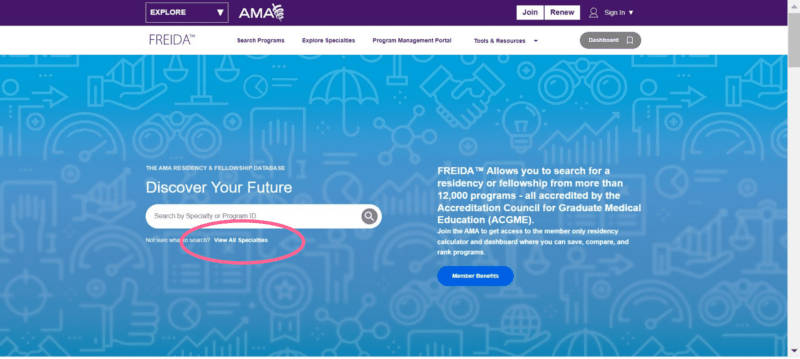
Click “View All Specialties”
You should see this window pop up:
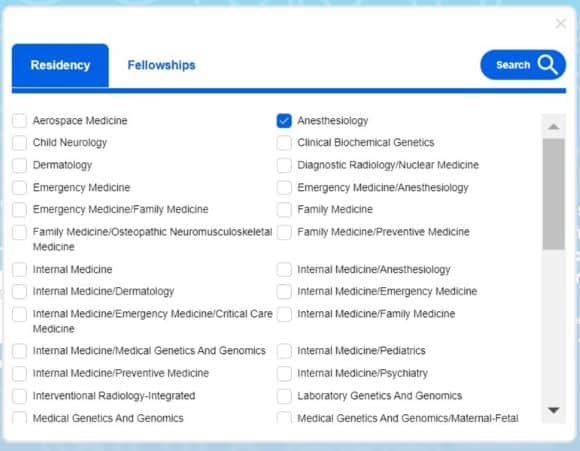
Click “Search” to view filters
Once you’ve performed a search, you’ll see the filter criteria.
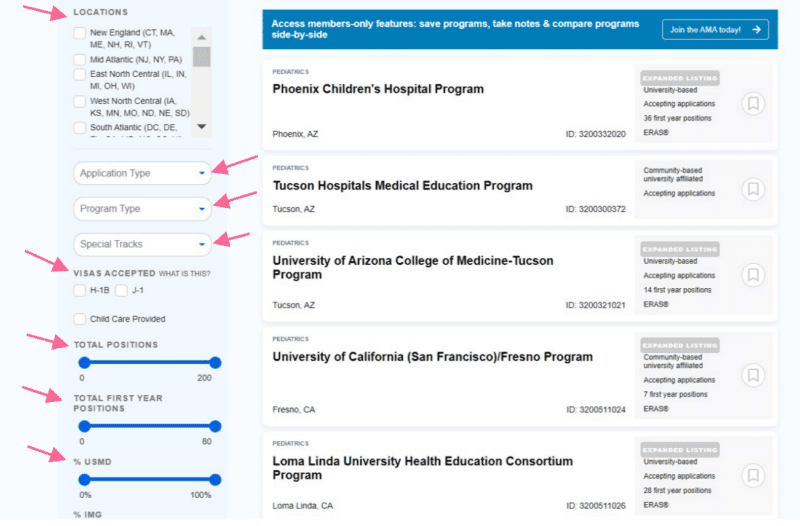
After selecting a specialty, and performing a search, you can see the (awesome) FREIDA filters
Find IMG-/DO-Friendly Programs in Under 5 Minutes
One thing that vexes IMGs and DOs is to finding IMG or DO-“friendly” programs. FREIDA makes this super easy.
(To read The IMG’s Guide to Obtaining Residency in the United States, click here).
On FREIDA, you can refine your search by state and specialty. Even better, you can sort for programs which offer J1 or H1-B visas (see below). You can also find programs that have had IMGs in the past.
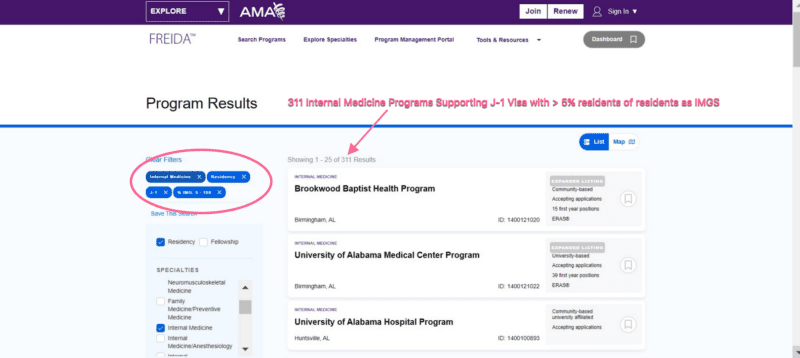
Search FREIDA for visa sponsorships, % of class that is IMG, and much more
As you can see above, I can search for internal medicine programs that sponsor J-1 visas. Additionally, I can even find programs that have above a certain % of IMGs. (In the above example, there are 311 IMG programs that support J-1 visas, and have ≥5% of residents as IMGs).
This is an effective way to generate a quick list. Once you have a preliminary list, you can go to the program’s actual website. There you can see further information, including IMGs among their current residency class.
DO Students: Sort for “USMLE Only” Programs
The merging of previously DO-only residencies with MD residencies has created some confusion. Are COMLEX scores going to be ok? Or do all DOs absolutely need to take the USMLEs to be considered for a program?
In FREIDA, programs list whether they accept “Only USMLE Required for Interview.” To clarify what exactly “USMLE Only” means, I asked my former program director at MGH, Dr. Daniel Saddawi-Konefka.
His response? “We currently do not accept COMLEX as a substitute for the USMLE.”
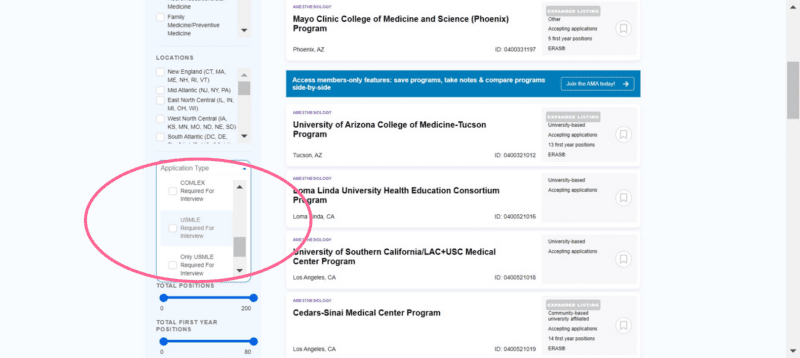
You can filter the program search by application requirements!
When might it be useful to know which programs care only about the USMLE? First, if your COMLEX and USMLE scores diverge, it’s good to know which programs will ignore COMLEX. Second, presumably “USMLE only” programs wouldn’t be overly “DO-friendly.” (Note this doesn’t mean they don’t accept DO’s. MGH Anesthesia had a couple DO’s during my time there. They were excellent residents.)
Finding More Program Information
When you filter out the list of programs to match your criteria, you can explore the specific residencies further! Simply click on the program that interests you, and you will be taken to their residency page.
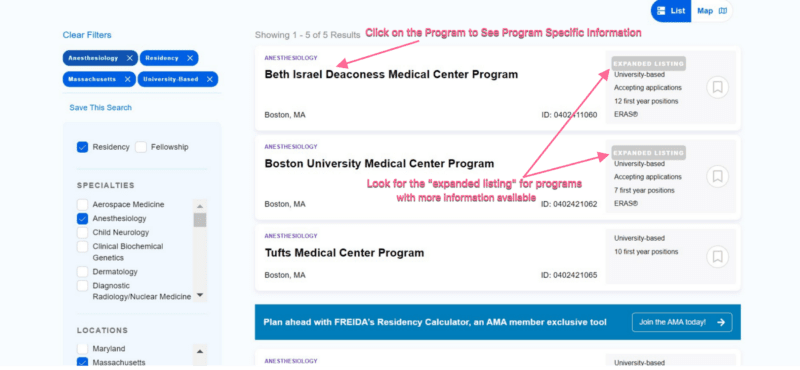
Some Programs have “Expanded Listings,” meaning they have more information available.
If you don’t have a free account or an AMA membership, you may see this popup:
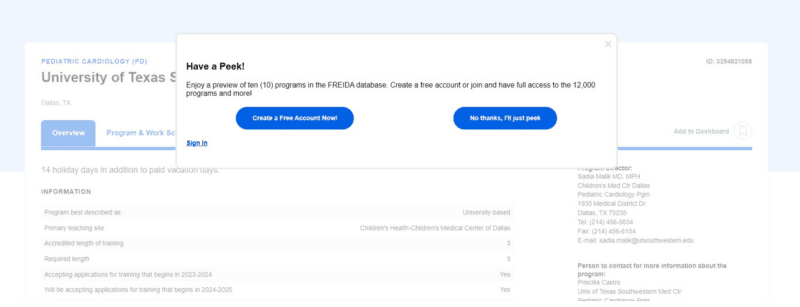
When you create a free account, you can access the entire database!
While creating a free account still won’t give you access to the comparison tool or dashboard, it does unlock an unlimited number of programs. This allows you to explore as many pages as you want to help you decide where you should apply.
What is a Residency Program’s Lifestyle Like?
No question: residency can be brutal on your personal life. However, not all residency programs are equal.
While lots of things go into a resident’s lifestyle, some of the most significant are:
- Average hours/week
- Call schedule
- Vacation/off days
- Residency salary
The best information source on resident lifestyle is talking to current residents. However, when you’re deciding where to apply, talking to residents isn’t an option. Here, FREIDA can give a good lifestyle overview.
Here are some examples taken from the Beth Israel Deaconess Anesthesiology Program.
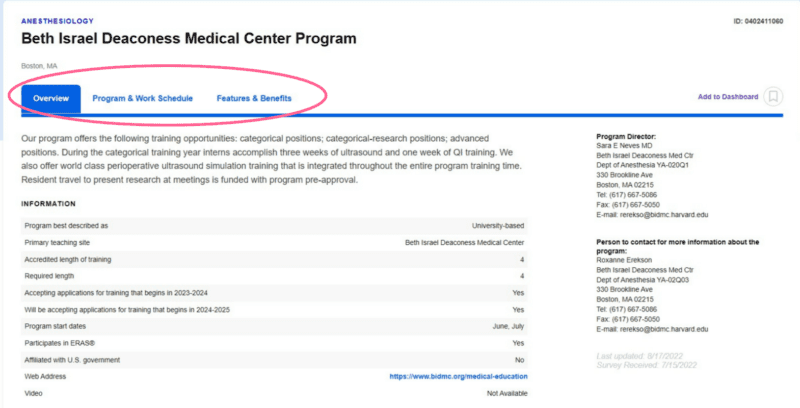
The Beth Israel Anesthesia Residency page contains lots of detailed information about the resident lifestyle
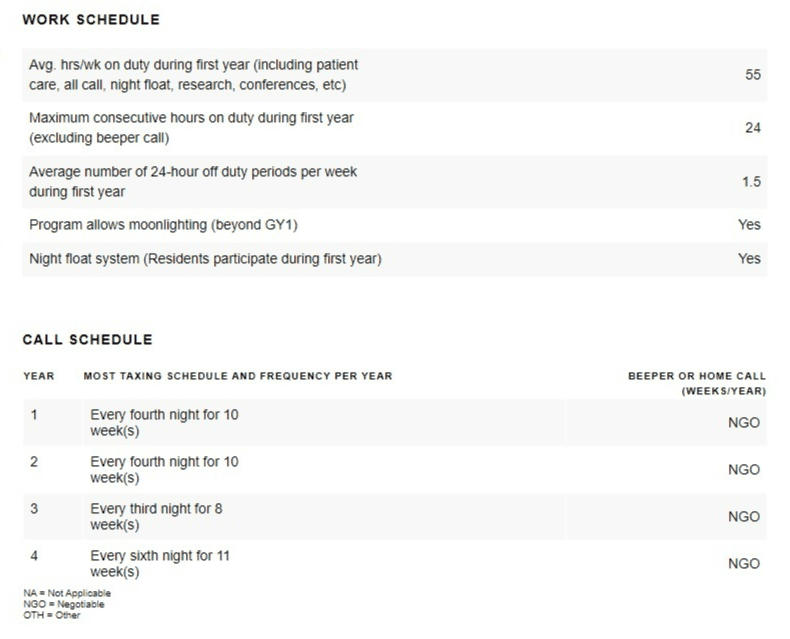
This page lists the most taxing residency call schedule, as well as expected work hours.
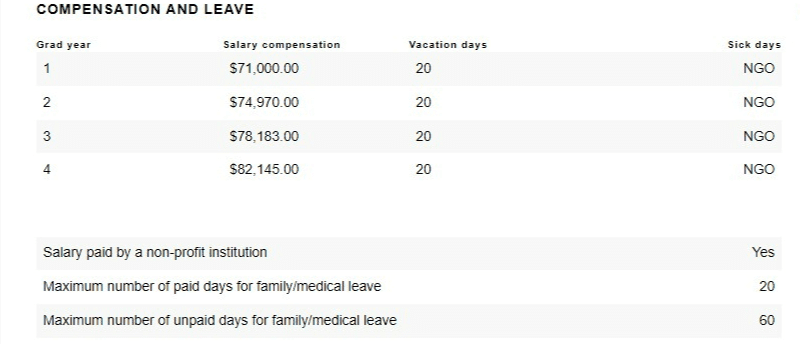
Curious to know the residency salary? Vacation days? Many residencies list that information
What criteria you use for choosing a residency are up to you. Many (including myself) take the “I can do anything for ___ years” mentality. However, 4 years of residency have changed my perspective a bit. (This is likely the topic of a different article). Suffice it to say I’m glad I didn’t choose the program with the most grueling reputation. (It certainly wasn’t the easiest, either).
Whatever you choose, there is a lot of useful information in FREIDA on resident lifestyle.
How Competitive is a Given Residency Program?
Wonder how competitive your application would be at a given program? FREIDA can help.
(To read Average Step 1, Step 2 CK Scores, Research by Specialty (US Seniors, IMGs), click here)
Ever wonder what a program’s minimum Board scores are? Here you can see quick stats, like USMLE Step 1 cutoffs, # interviews, etc. by going to each program’s individual page. Some residencies also share residents’ average Boards scores.

Under “Programs” you can see some programs’ average board scores
Programs list the number of interviews they give and first-year spots available. This can give you a sense of how competitive it is to get an interview.
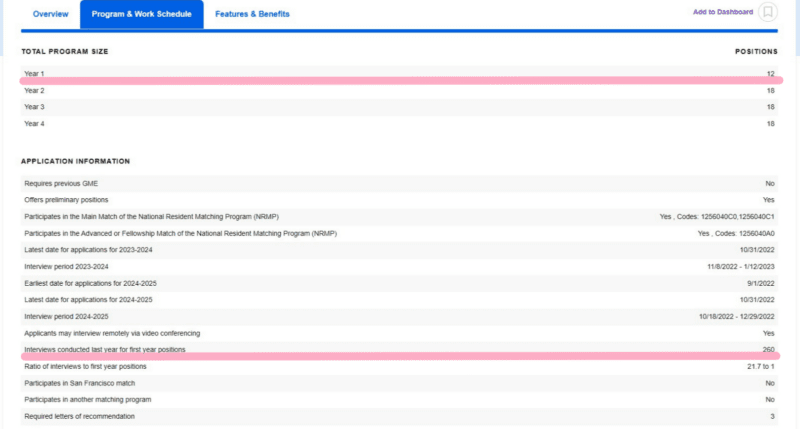
You can see the number of positions available, the number of interviews, and much more!
No one likes to waste time/money. FREIDA can help you find programs with varying levels of competitiveness.
FREIDA: What’s the “Catch”?
I know what you’re thinking: “FREIDA sounds perfect. What’s the catch?” Honestly, it is by far the best tool I’ve found to find up-to-date information on programs. However, nothing is perfect. FREIDA is based on surveys from the programs themselves. While I doubt many programs would misrepresent themselves, not all programs share all information.
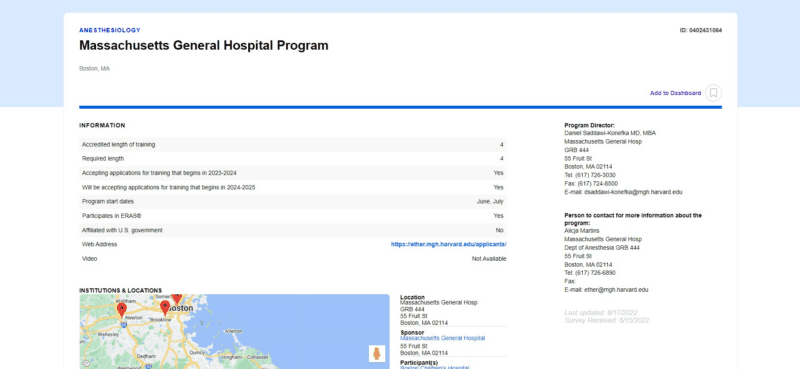
You can look at each program individually for more detailed info. Note that not all programs report all info.
For example, the Harvard-MGH Anesthesia program (above) only lists basic information. They don’t include cut-off Step 1 scores, % of residents who are IMGs, or what visas they sponsor. Having completed my residency there, I know that they have IMGs and sponsor visas, but programs like MGH Anesthesia won’t show up in your searches.
If you reach a FREIDA dead-end, the best next step is to look at the program’s website. They sometimes have relevant information. (Sometimes not).
Ultimately, you may have to contact the program directly. Still, FREIDA helps minimize the need to contact programs/scrutinize residency homepages.
Use FREIDA During Interview Season to Show You’re a Good “Fit”
Although you can use FREIDA at any time, there are likely two times you’ll find it most useful. First, as we’ve discussed, you can use it to generate a list of programs you might want to apply to. However, I’d also recommend using it during your interview season.
Board scores are essential for getting an interview. However “program fit” determines where you’ll match. One way that you can show you “fit” with a program is by having specific knowledge of a program.
For instance, most interviewers get tired of answering the same questions every time.
- “What is the call schedule?”
- “Is there an iPad allowance?”
- “What are the average work hours/week?”
Generic questions like these show you didn’t do your homework. Instead, with the FREIDA survey, you can generate much more detailed questions.
- “I see that you offer MPH/MBA or Ph.D. training. How many residents take advantage?”
- “I saw you listed ‘international experience’ for residents on FREIDA. Can you tell me about a recent experience that a resident took?”
Residency interviews are like dating. The more interest you show in a program, the more likely they are to like you back. Obviously, you want to show genuine interest. Asking questions just to ask them may not have the desired effect. However, coming in with specific questions can help you stand out and demonstrate you’ll be a good “fit.”
(To read Interviewing to Match Into a Competitive Residency, click here).
Concluding Thoughts
Students often discuss their residency program search as excruciating. IMGs and DOs, in particular, have it rough. IMGs have made spreadsheets with every program for a given specialty. They spent countless weeks painstakingly combing through each program’s website to determine “IMG-friendliness.” Even worse, much of the information was suspect, as many of the sites were out-of-date.
Most med students don’t know there’s a much better way to search for residency programs. Heck, I barely used FREIDA when I was a med student. I certainly didn’t know about its power until I was writing a different article. Now, I’m convinced it’s the best source of relevant, up-to-date training program information.
What do you think of FREIDA? Have you used it? Let us know in the comments!
Photo Credit: JESHOOTS.COM

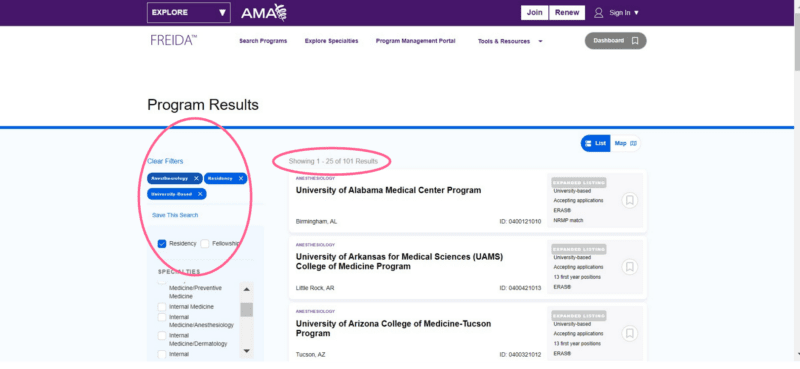
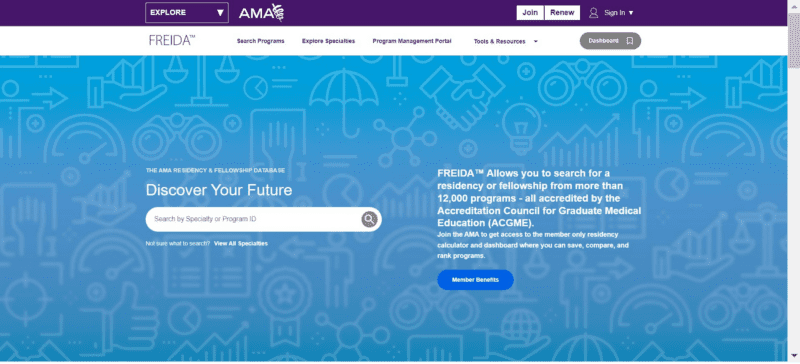
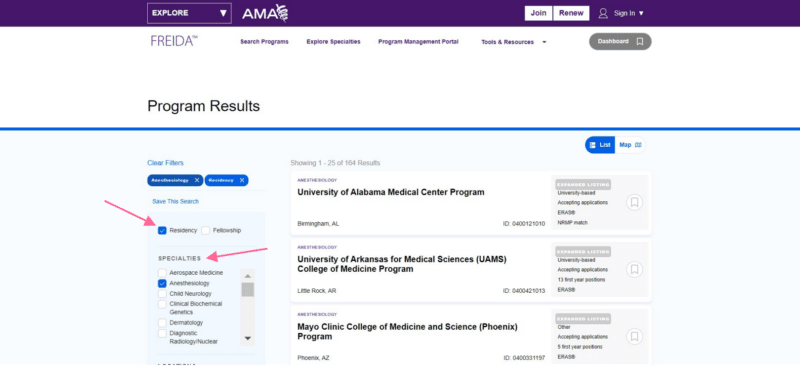







Thank You for very detailed instructions. What do You think about residencyexplorer or residencyprogramslist? Is it all the same or some different information?